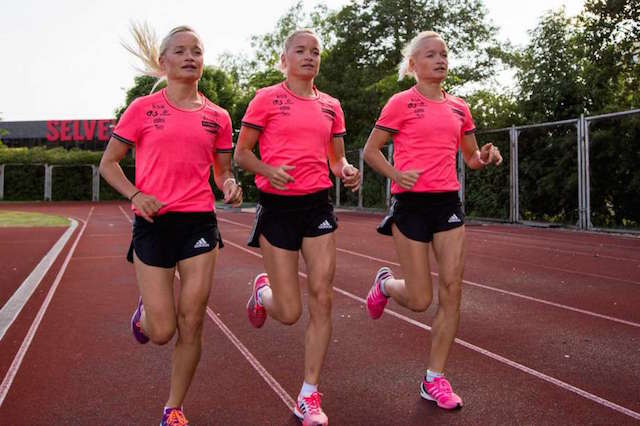Meet the Trio for Rio: Triplets plan to run Olympic marathon

In this photo taken on Thursday, June 2, 2016, Estonian athletes sisters Lily Luik, left, Liina Luik, center, and Leila Luik attend a training session after an interview with The Associated Press at a track in Estonia. The 30-year-old sisters will be the first triplets to compete in the Olympics, all of them running in the women’s marathon, and say they are used to judges getting them mixed up in events. AP
TALLINN, Estonia — Fans at the Rio Olympics will be seeing not just double, but triple in the women’s marathon when identical triplets race together for the first time.
Calling themselves the “Trio to Rio” and sporting identical uniforms and blonde ponytails, Estonians Leila, Lily and Liina Luik are used to spectators and officials mixing them up when they’re competing.
Article continues after this advertisement“They don’t know who is who,” Lily said. “Commentators see one of us is coming, and the other is a little bit later, and then comes the third one. It’s like: ‘So fast, you are already here.'”
The triplets joked among themselves and finished sentences during an interview with The Associated Press at a track in Estonia’s capital. Asked how they decided to turn pro and try for the Olympics, Liina and Lily answered in unison “together.”
Twins are not uncommon in the history of the Olympics, which has many tales of sporting families. But triplets are a first, according to Olympic historian Bill Mallon, who keeps a database of athletes.
Article continues after this advertisementThe 30-year-old sisters are from the medieval city of Tartu, and they only turned pro at the relatively late age of 24. They don’t come from an athletic family.
Keen to play outside from a young age, they took up distance running because “we feel the nature vibe,” Liina said.
Lily said jokingly that the marathon is an “easier” way to travel than hiking.
Whether training or racing, the triplets have a relentless competitive drive and family solidarity. They want to break each other’s personal best (currently held by Leila) but also race tactically, taking turns at the tiring task of leading the pack and facing greater wind resistance.
“When its hard conditions and someone is little bit behind or weaker, we all push each other — ‘Go, go on, come on, don’t stop,'” said Leila, the oldest. “Together we are like a dream team.”
“If one of us has a bad competition or something, everyone feels that,” Lily said. “Injuries (are) also very bad for us because if one of us couldn’t compete somewhere it’s … not a complete team.”
The sisters are favored to take Estonia’s three qualifying spots for the marathon, but they’re not likely to win a medal since Leila’s best time of 2 hours 37 minutes 11 seconds is almost 15 minutes slower than the Olympic record. There’s a strong tradition of Nordic distance running, especially in Estonia’s neighbor Finland, but African countries are the undisputed leaders of the modern marathon.
Still, spirits are high for the “Trio to Rio.”
“The nervousness hasn’t come to us,” Lily said. “Definitely, it would be great to finish all together. It would be difficult, but we try it.”